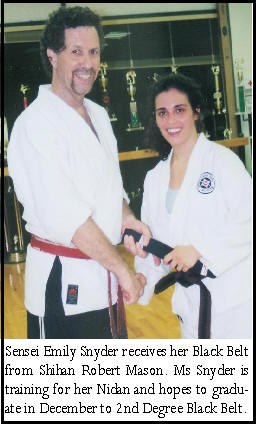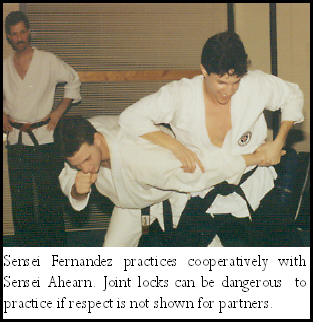
OCTOBER NEWS
Conquering the belt graduation
After receiving three red stripes, students are eligible to be promoted to a new rank, signified by a black stripe or a new color belt. The new belt serves as a symbol of continued improvement in Mudokai. This tradition has existed only since the 20th century, but is inherited from an old tradition of wearing special belts. Prior to the 20th century, all Martial Artists wore white belts, but these would become darker over time as a result of all the exertion put into the practice. This is why the belts become darker as the rank of the student increases.

What to expect: Belt Graduation can make some students very nervous, especially if it is their first promotion. It is natural for us to feel pressure to perform admirably in front of peers or parents. After all, we would like prove that the time and energy invested in Martial Arts training over the past few months or years has been fruitful. This is a normal reaction and can actually be very helpful. A little bit of nervousness can give the focus, edge and fire that you need to perform your best. Often someone who feels over-confident becomes careless and sloppy. Consequently, this student does not perform as well as a student who is more nervous.
Keeping Focused: Nonetheless, never let your nervousness overpower your presence of mind. During the graduation seminar, try to remain focused at all times, even when other students are performing their routines. This is very important, because you can often learn a great deal by watching the other students. Pay close attention to their strengths and also notice any moves they could improve on. Focused attention will enable you to perform more efficiently when the time comes, and will mold you into a better Martial Artist in the long run.
Performance: When your time comes to test, focus all of your attention on the task at hand. This is the point at which you will be in the greatest danger of falling prey to nervousness, but it is also the point at which you will be most able to utilize your nervous edge. Keeping a clear focus on the task at hand, rather than the nervousness, will allow you to perform your best without becoming careless. Remember that being nervous will help you prepare for tournaments, or demonstrations where you will have to perform at your absolute best, regardless of the presence of an audience, and also for real-life situations where you might need to defend yourself or somebody else. You should remain confident throughout the graduation seminar or any other test of your training.
Confidence: It is good for you to be confident in your abilities, especially if you know that you have done the best job possible in enhancing and developing your skills; confidence is the key to key to success. Nevertheless, overconfidence and carelessness can hurt you as much as being too nervous or low in confidence. The goal of the Martial Artist is to find an inner balance, a center, that in the end will help you to achieve all of your goals in life.
© Shihan Robert H. Mason 2005
Strength in Unity
As a Martial Arts student, you learn some very important lessons regarding how to practice. One of these lessons is that there is greater strength in developing a cooperative spirit with your Dojo brothers and sisters than there is in being self-centered all of the time. The good Martial Artist knows that it is better to work cooperatively with a fellow student than to compete against them, and the shared victory is ultimately a greater victory, than the victory of one person's vanity over the best efforts of another. This develops teamwork and the experience of strength in unity. It is very easy to break a pencil in half. Breaking ten pencils in half is an altogether different matter.
Be Polite: Always be polite to your fellow students. The reason why you bow to your partner, before and after sparring and to your instructor, is to show respect. When you are impolite to others, you show disrespect, not only to those students, but to the martial arts community. It is a demonstration of superior understanding when you behave in a disciplined manner, and show respect, not just in the Dojo, but everywhere you go in life.
Show Good Sportsmanship: Itís also important to be a good sport. Nobody likes to feel beaten when sparring, or think that they performed badly when they did their best. Nevertheless, every experience is a learning opportunity. Learn from your mistakes and profit from them. Keep control of your temper and your actions. Sometimes students lose sight of the fact that sparring is an exercise in timing and distancing, and approach it as if it is a real fight. You know better than this, and you should always be able to demonstrate it. Good sportsmanship is fundamental.
Work with other students: For example, if you are sparring with another student who is not as experienced as you are, do not try to show the other person up. Nothing is gained by this behavior. Try instead to work with that person so that the exercise can help develop both of your skills. Often you will be surprised at some of the things that you can learn from a less experienced student: everybody has their different strengths and weaknesses. Try to put yourself in his or her place. Imagine if your instructor, in order to demonstrate something, asked you to spar with him or her, and proceeded to do nothing but demonstrate his or her ability to hit you, in front of the other students. Do you think you would benefit much from the experience?
Ask for help: A lot of students are afraid to ask a question for fear that it will sound stupid, or they will appear to be less advanced than their peers. This is counter productive. When you do not ask for help. or you pretend to understand something that you do not, you put yourself at risk of falling behind. When the time comes for you to demonstrate what you have learned, all of your confusion will be evident, and you may be more embarrassed than you would have been initially by just asking the question. There is no embarrassment in asking for help. Often, questions which you may think sound foolish, are shared by many other students, and can have useful consequences. The Martial Arts are very precise. Like any other disciplined art form, the nuances need to be constantly studied and repeated. When you ask questions you demonstrate your interest and respect for our art. The Dojo is a place where a team of students work together to perfect a discipline. Everything depends upon that. Concern yourself with the process of learning that is going on; think about how to work with the other students so that the whole class can progress. How you behave is important. Remember that we are all learning together. © Shihan Robert H. Mason 2005
